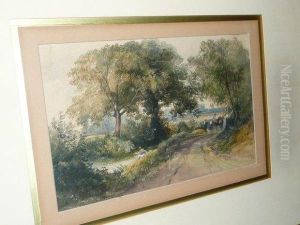Thomas Dibdine Paintings
Thomas John Dibdin, born in 1771 in London, England, was a prominent English dramatist and songwriter known for his contributions to the theater during the late 18th and early 19th centuries. Not to be confused with Charles Dibdin, a related figure in the realm of theater and music, Thomas Dibdin carved out his niche through a prolific output of plays, operas, and songs that captured the spirit and complexities of his time. His career spanned a period of significant change in British society and theater, reflecting the evolving tastes and interests of his audience.
Dibdin's early life was marked by a fascination with the theatrical world, largely influenced by the vibrant cultural landscape of London. He ventured into the world of theater at a young age, initially working in various capacities before establishing himself as a writer. Over the years, Dibdin's talent for crafting engaging narratives and memorable melodies earned him a reputable place among his contemporaries. He was particularly adept at composing pantomimes, a popular form of entertainment in the 18th and 19th centuries, which combined music, dance, and slapstick comedy to tell a story.
Throughout his career, Dibdin's works were performed in many of London's theaters, contributing significantly to the cultural fabric of the city. His ability to blend humor with poignant commentary on social issues endeared him to a wide audience, making his plays and musical pieces frequently performed pieces. Despite facing the challenges common to artists of his time, including financial instability and the changing tastes of the public, Dibdin remained a dedicated and influential figure in the theater world until his death in 1841.
Dibdin's legacy is preserved through his extensive body of work, which continues to be studied and appreciated for its historical and cultural significance. While he may not be as widely recognized today as some of his contemporaries, Dibdin's contributions to the development of British theater and music are undeniable. His works offer valuable insights into the social and artistic dynamics of his era, making him an important figure in the history of English art and theater.
